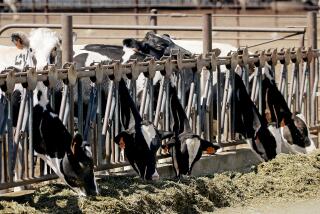Part-Time Milker Skims Off a Little Extra Moola
- Share via
ALMONT, N.D. — The three-word ad was tucked in a corner of the weekly New Salem Journal, and it knocked dairy farmers off their stools all over Morton County. “Will do milking.”
Some say the dairy industry loses more farmers to the twice-daily, year-round grind of milking the herd than to fluctuating prices. Geraldine Dittus knows that as well as anyone. Without helpers when her children grew up and left, she and her husband, Vernon, gave up dairying 10 years ago.
Geraldine Dittus ran the ad only twice in May.
Pat Erhardt, who farms near Almont, 30 miles west of Bismarck, hired Geraldine Dittus so he and his wife could get away for the weekend. “We can go to a wedding and enjoy ourselves a little,” he said.
Dittus is already booked every weekend next month. She has jobs lined up on Labor Day weekend too, and in October.
“The first night I got two calls right off the bat,” she said. “A lot wanted me more in August, when the fairs are on or they have weddings.”
Her jobs are mostly near to home in southwestern Morton County, though one call came in from the Minot area, a 2 1/2-hour drive north. “They wanted me to come up and stay a few days, but that’s too far,” she said.
North Dakota has about 1,500 dairy farms left, about 100 fewer than 1 1/2 years ago and 500 fewer than in 1987, said state Dairy Commissioner Gary Hoffman. Nationwide, about 13,000 dairy farms have gone out of business since 1987, said economist Jim Miller of the U.S. Department of Agriculture.
The reasons include automation, a trend toward larger farms and technological advances that allow producers to get more milk from each cow, Miller said. But changing lifestyles also are a factor, he said.
“There certainly used to be a great number of dairy farmers that took an almost perverse pride in never doing anything very far from the farm,” Miller said. “I think that’s less common now.”
Geraldine Dittus, 51, who raises beef cattle, pigs, sheep and grain on the 600-acre family farm west of Almont, charges 50 cents to hook up each cow to the machines for milking. “I’d say I make about $200 extra a month.”
More to Read
Inside the business of entertainment
The Wide Shot brings you news, analysis and insights on everything from streaming wars to production — and what it all means for the future.
You may occasionally receive promotional content from the Los Angeles Times.









